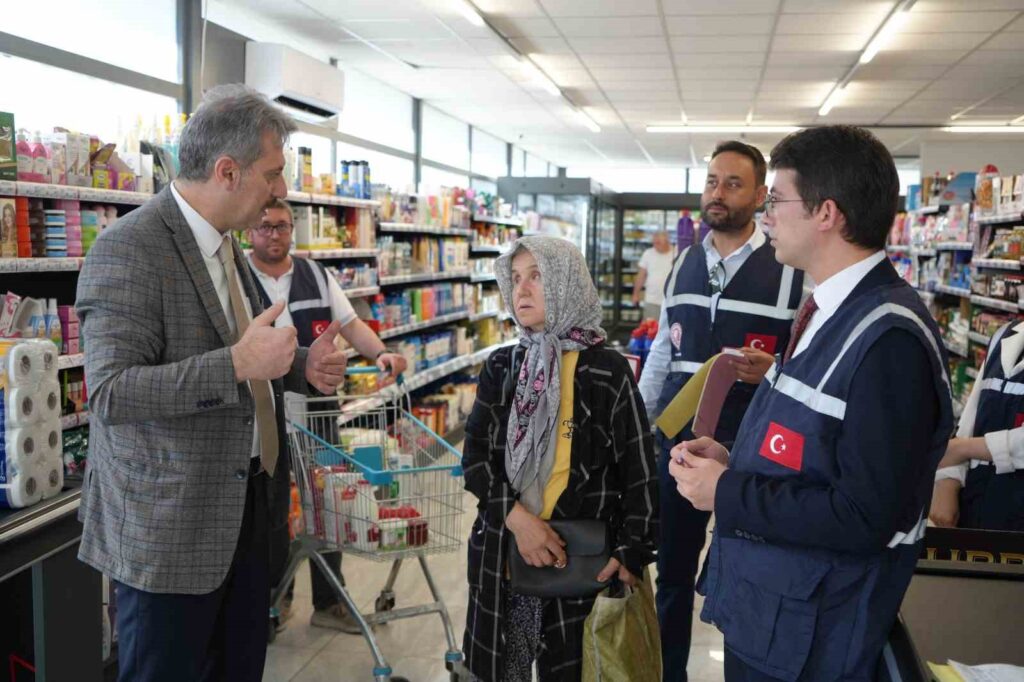Dried fruit exporters are seeking a common consensus for the difficulties they are experiencing.
The Board of Directors of the Southeastern Anatolia Dried Fruits and Products Exporters Association met with Gaziantep Governor Kemal Çeber regarding the struggles faced by dried fruit exporters. Recently, the prices of pistachios have been internationally …

The Board of Directors of the Southeastern Anatolia Dried Fruits and Products Exporters Association met with Gaziantep Governor Kemal Çeber to discuss the difficulties faced by dried fruit exporters.
Recently, dried fruit exporters have been facing the danger of losing the European market due to the significantly high international prices of pistachios and widespread hoarding activities. They are visiting relevant institutions to express their solutions and efforts to protect existing markets. In this context, the Board of Directors of the Southeastern Anatolia Dried Fruits and Products Exporters Association recently visited Gaziantep Governor Kemal Çeber.
“The contribution of pistachios to the economy is also significant for the potential development of the entire region.”
Mehmet Çıkmaz, the President of the Southeastern Anatolia Dried Fruits and Products Exporters Association, mentioned the ongoing issues and the importance of pistachios, stating, “Pistachios are one of the most important agricultural products in our region, contributing approximately 5.5 billion dollars annually to the regional economy. Our pistachio harvest, which was 53,000 tons in 2014, is expected to reach 500,000 tons in 2024. Compared to other agricultural products, pistachios provide farmers with more stable income, and the planting of seedlings has been increasing every year for the past 20 years. This year’s harvest is projected to be 500,000 tons, and with the productivity of new trees, the expected harvest five years from now will be around 1 million tons. In parallel with the increase in production, the marketing efforts of our association, companies, and chambers, such as advertising, fairs, and product promotion, have also led to an increase in consumption. The pistachios produced, processed, and sold with years of knowledge and effort have recently attracted the attention of both large and small-scale speculative hoarders. Thus, pistachios, which can be stored as raw material for 2-3 years, have led to sudden and severe price drops when overstocked and, at times, sudden and severe price increases due to scarcity, influenced by social media, where everyone affects each other on these platforms,” he said.
Speaking about the price instability in pistachios, Mehmet Çıkmaz stated, “Price instability undermines exports, reduces the confidence of dried fruit and products exporters in pistachios, and thus new employment, investment, and promotional activities are put on hold. As a result of this price instability, the export rate of pistachios cannot increase, and for years the share of exports has not exceeded 10%. If the export share does not increase proportionally with the annual increase in harvest, in the coming months and years, the pistachios produced with years of labor will not achieve their deserved value.”
Highlighting the most significant problems faced in dried fruit exports, President Çıkmaz mentioned, “In pistachios, considering that the crop is 400% more than last year, our exporters have focused on promoting new and existing products and creating demand since August. Significant expenses have been incurred to create this demand, and new investments and increases in employment have been achieved. Thus, between August 1 and October 31, 2024, which is considered the harvest season, there has been a 94% increase in exports compared to the same period last year. However, the improper storage of products by intermediaries for unsuitable purposes and conditions has caused prices to rise excessively.”
President Çıkmaz also drew attention to the improper storage conditions of pistachios, stating, “Despite the surplus harvest, the pistachios that are improperly stored and not offered to the market are creating a direct inflationary effect, leading to price increases in products such as baklava and chocolate that heavily use pistachios. Products kept in unsuitable conditions in warehouses lead to the production of microbiological bacteria. This year, due to the high harvest and the rapid increase in the number of pistachio businesses in villages, microbiological bacteria have been more frequently seen in pistachios compared to previous years due to infrastructure deficiencies and unprofessional activities. Thus, the demands created abroad with great effort are quickly shifting to other producing countries that have stability and price advantages and produce the same products.”
Emphasizing the risks of losing markets that have been built over many years of hard work, President Çıkmaz stated that if these significant problems are not resolved quickly, they will face the risk of losing these markets. He mentioned the need for the solutions to these problems, stating, “The supply of pistachios must be continuously regulated with certain arrangements. With our current initiative, due to the problems that have persisted in domestic supply for years, it is aimed to allow the supply of raw pistachios from abroad to our industrialists/exporters under the Inward Processing Regime. This is intended to increase the value-added and exports of our region and country. Although we do not wish to procure raw materials from abroad during a period of such high harvest, due to the fact that raw material prices in our country are significantly above global prices and the problems experienced in raw material procurement, we are forced to seek alternative solutions for the sustainability of trade and exports, as well as the continuity of employment and processing capacity.”
Joint efforts will be made with institutions for a quick solution to exporters’ problems.
Çıkmaz, who stated that joint work will be done with institutions to solve the problems, said, “The Board of Directors of the Southeastern Anatolia Dried Fruits and Products Exporters Association, which has reached an agreement with Gaziantep Governor Kemal Çeber for joint efforts, emphasized that stability must be ensured and that exports should be facilitated for employment in the sector and foreign currency inflow into the country. They decided to work on the urgent activation of the Inward Processing Regime for a limited time and amount and the necessity of starting cooperative establishment efforts to ensure stability in the sector in the medium term. In addition, Governor Kemal Çeber stated that there will be no tolerance for unregistered products in pistachios, which are an important agricultural product of our city, and that inappropriate and unregistered storage will not be tolerated.”







